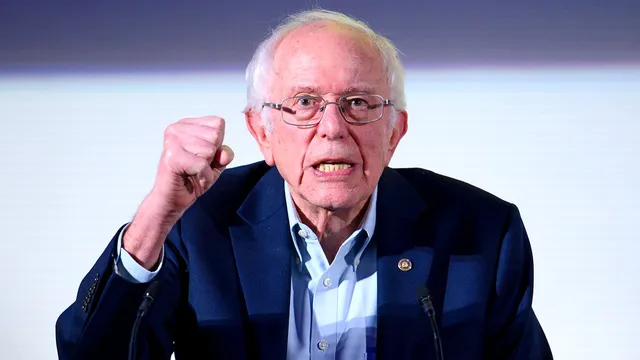
Bernie Sanders urges the U.S. to avoid war with Iran
2025-06-24 14:30- Israel launched an unprovoked attack on Iran's nuclear facilities on June 13th, 2025.
- Bernie Sanders emphasizes that the U.S. must not engage militarily in Iran's conflicts, citing past mistakes in Vietnam and Iraq.
- The U.S. should prioritize diplomatic solutions rather than military involvement in Middle Eastern conflicts.
Express your sentiment!
Insights
In the context of escalating tensions, on June 13th, 2025, an unprovoked attack on Iran's nuclear facilities was launched by Israel, igniting fears of a larger conflict in the region. This event occurred against the backdrop of President Donald Trump's military action against Iran's nuclear capabilities, a direct response to what Sanders describes as a violation of international law. The history of U.S. military engagements is fraught with lessons from past conflicts, including Vietnam and Iraq, which saw immense loss of life and societal division. Sanders emphasizes the importance of congressional authority to declare war, highlighting that Trump's unilateral decision lacked justification given that there was no imminent threat posed by Iran. Sanders reflects on the narrative that helped justify the Iraq War in 2002, where assertions made by leaders, including Israeli Prime Minister Benjamin Netanyahu about Saddam Hussein's alleged pursuit of nuclear weapons, contributed to the push for military intervention. He indicates that such rhetoric should not guide U.S. policy towards Iran, especially given the past mistakes. The Senator asserts that Israel's actions against Iran are their business and should not involve U.S. military support, framing it as a moral obligation to avoid facilitating conflict that results in high civilian casualties. Furthermore, Sanders condemns the ongoing humanitarian crisis resulting from Israeli military actions against Palestinians and calls for a more nuanced view of international relations. He states that condemning Israel's aggressive actions is necessary for a just foreign policy. The overarching theme of Sanders's argument is a plea for restraint, diplomacy, and a careful evaluation of America's alliances that compass military involvements abroad. He argues that affiliations with governments that perpetrate humanitarian violations are not conducive to upholding American values or international law. Ultimately, Sanders concludes that the U.S. should adopt a position that refrains from endorsing military interventions stemming from external influences, particularly from factions that act in ways that contravene international standards of conduct. He calls for a policy that prioritizes peace and dialogue while avoiding entanglement in conflicts initiated by other nations, thereby suggesting a need for strategic reassessment of U.S. foreign policy towards the Middle East.
Contexts
The history of U.S. involvement in Iran is complex and multifaceted, marked by a series of political, economic, and military engagements that have shaped the relationship between the two nations and have wider implications for international relations. The United States began to take an active interest in Iran in the early 20th century, primarily due to its strategic location and oil reserves. This interest intensified during World War II when Iran was deemed crucial for the supply of oil to Allied forces. Following the war, U.S. influence in Iran grew, particularly after the CIA orchestrated a coup in 1953 that overthrew the democratically elected Prime Minister Mohammad Mossadegh. This intervention was motivated by a desire to secure oil interests and counter perceived communist threats during the Cold War, and it ultimately led to the consolidation of power by the Shah, Mohammad Reza Pahlavi. The Shah's regime, backed by the United States, was marked by efforts to modernize and secularize Iran, but it also led to widespread discontent due to political repression and social inequality. This unrest culminated in the Iranian Revolution of 1979, which resulted in the establishment of the Islamic Republic under Ayatollah Khomeini. The revolution had profound consequences for U.S.-Iran relations, leading to the severance of diplomatic ties and the infamous takeover of the U.S. Embassy in Tehran, where American diplomats were held hostage for 444 days. This event not only soured American perceptions of Iran but also reinforced Iran's view of the U.S. as an adversary. Following the revolution, U.S. policy towards Iran shifted dramatically, characterized by economic sanctions and diplomatic isolation. The latter part of the 20th century saw further complications with Iran's support for groups opposed to U.S. interests in the region, such as Hezbollah in Lebanon. The 1990s brought a focus on the potential nuclear threat posed by Iran, particularly after revelations about its nuclear program. Tensions continued to escalate in the early 21st century, especially following the events of September 11, 2001, which prompted the U.S. to engage in military actions against perceived threats in the region, including Iraq. In the late 2000s and early 2010s, diplomatic efforts were made to address Iran's nuclear ambitions, culminating in the Joint Comprehensive Plan of Action (JCPOA) negotiated in 2015. This agreement aimed to limit Iran's nuclear program in exchange for sanctions relief but faced significant challenges and criticisms from various factions, including the U.S. Congress. In 2018, the Trump administration unilaterally withdrew from the JCPOA, reinstating strict sanctions on Iran and further escalating tensions. As of 2025, the historical legacy of U.S. involvement in Iran continues to influence policies and perceptions, highlighting the enduring complexities and the significant impact of past actions on current international dynamics.